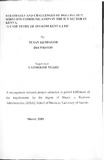| dc.description.abstract | ICT is the World's fastest growing economic activity. The sector has turned the globe into an increasingly interconnected network of individuals, firms, schools and governments communicating and interacting with each other through a variety of channels and providing economic opportunities transcending borders, languages and cultures. The ICT environment is competitive both in Kenya and in the world in general. There is need for competitive strategies for a firm that rolls out Wireless Communication in ICT for it to gain competitive edge in the market. It was on this impression that this study was carried out.
This was a qualitative research which relied on qualitative data i.e. the data collected was mainly ideas rather than numbers. Case study was the method for data collection. Telkom Kenya Ltd which offers integrated telecommunications services on fixed networks, Wireless and Mobile Networks was the case study. Primary data was collected by way of personal interviews. In-depth interviews were conducted on 30 staff of Telkom Kenya. These were functional heads and managers in the Technical, Business Marketing and Wholesale departments. The other method of data collection was the use of secondary data which was internal data of the organization. Data was analyzed through content analysis.
Based on the study findings the following conclusions were made: The strategies for a Wireless Communication firm to be competitive in the telecommunication market are mainly centered on accessibility of the service, quality of the service, availability, mobility, affordability, short lead times of customer connections, advertisements and promotions. The challenges on Wireless Communication are expensive sites acquisition and Co-location for base stations, geographical factors that affect signal strength, low transmission bandwidths, unavailability of physical address of subscriber lines, poor interconnection agreements with other operators, regulatory challenges, high turnover of skilled labour, poor distribution channels of the services and stiff competition in the market. | en |

